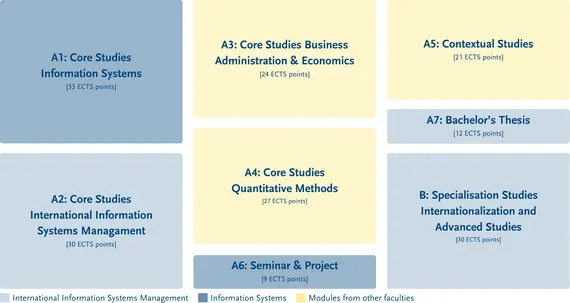Structure and Curriculum
The bachelor’s programme in “International Information Systems Management” is comprised of eigth module groups. The module group distribution follows from the module scheme seen at right (click to enlarge).
The content of individual module groups is presented below. Detailed information concerning courses and modules pertaining to each module group can be found in the programme’s module handbook (see Regulations and Documents). In that section we also provide an exemplary model for course timetables.
Providing a solid foundation in business informatics and information systems, databases, computer and operating systems as well as information and knowledge management.
The following modules are included:
- Introduction into Information Systems
- Development and Operation of Application System
- Introduction to Computer Science
- Knowledge- & Informationmanagement
- Database Systems
This module group offers an introduction to international information systems management.
Exemplary module selection options:
- IT-Controlling
- International IT Project Management
- Fundamentals of International IS Management
- Artificial Intelligence in Practice
- Change Leadership
- Enterprise Architecture Management
Teaching the basics of (cost) accounting, and financing.
Exemplary module selection options:
- Introduction to Business Administration
- Introduction to Economics
- Bookkeeping
- Cost Accounting
The module group teaches mathematical fundamentals, which form the basis of important quantitative methods.
- Mathematics for Economics & Business I,
- Mathematics for Economics & Business II,
- Statistical Methods I & II, and
- Statistics & Data Science.
One significant focus area in contextual studies is the acquisition of subject-specific foreign language skills essential for graduates’ future professional activities. Furthermore, modules in the fields ethics, general key skills (e.g. presentation or rhetorical training), and the fundamentals of academic methods may also be selected.
The degree programme stipulates attendance of one bachelor’s seminar. In these courses, specific topics and problems pertaining to various segments of International Information Systems Management are expanded on and discussed. In addition, students have to take an information systems project. In this project, theoretical concepts are applied on real world problems.
Within the scope of the bachelor’s thesis, students employ academic methods to work independently on a specified topic as it relates to Information Systems Management. The topic can be derived from the information systems, computer science, applied computer science and business administration and management subject areas.
One of two variations is to be selected in the area of specialisation studies. In the frst variation, students earn course credit at a foreign university within the scope of a semester abroad, and these credits are, as a rule, recognized by the University of Bamberg and credited to studies here. In the second variation, a compulsory internship in an IT department of a company or another institution operating internationally must be completed. Practical activities and performance are outlined in an internship report. Additional elective courses from the bachelors’s programme with a focus on information systems, applied informatics, and economics round out the practical experience gained from the internship.
Continue to Admission and Enrolment.
